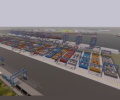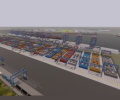

The Port of Newcastle’s hopes of building a container terminal before Port Botany reaches capacity by 2030 are “far-fetched and fanciful,” a Federal Court justice has declared in a judgement against the competition watchdog.
The Federal Court on Tuesday released the judgement of Justice Jayne Jagot on a case brought by the Australian Competition and Consumer Commission (ACCC) against NSW Ports.
The ACCC took the NSW Ports consortium, which operates Port Botany and Port Kembla, to court in 2018, alleging deeds in the ports’ sale agreement were “anti-competitive and illegal”, but the Federal Court dismissed the case in June.
The ACCC is still reviewing the judgement and considering whether to appeal.
The judge concluded that the potential effect of provisions in the deeds giving the NSW Ports consortium compensation once the Port of Newcastle grew big enough to handle 30,000 20-foot equivalent units annually was to “prevent or hinder” the Port of Newcastle from starting a rival container port.
But she found the provisions were not likely to lessen competition and described the Port of Newcastle’s hopes of building a container terminal while there was still capacity at Port Botany as “far-fetched and fanciful” unless there was a change in the NSW government and a change in state policy.
“There was and is not any credible threat of entry by Port of Newcastle into the pleaded market for container port services in NSW,” the judgement said.
“Even if Port of Newcastle can ultimately establish that its container terminal while Port Botany has capacity would be viable (which is itself not a real chance on the evidence to date), it would still need to persuade the NSW government that it would be in the public interest of NSW overall that it be permitted to construct the container terminal.”
NSW Ports chief executive Marika Calfas said the Port of Newcastle hadn’t been able to demonstrate a business case for developing a container port terminal even though it had been working on it for many years, and that the most cost-efficient means of moving freight in and out of NSW was to use Port Botany.
The judgement said NSW wanted to maximise profits when privatising the port in 2013, and wanted to make sure that bidders did not discount their offers due to the risk of a competing container terminal emerging at Port of Newcastle.
The judgement reveals that Morgan Stanley, which was hired in 2011 to advise the state, warned NSW Treasury in March 2013 that the Port of Newcastle could develop container capacity and if this issue was not addressed, bidders were either likely to seek protection from potential future development or re-price their bids, which would create “a potentially material impact on transaction proceeds”.
Morgan Stanley said at the time that at least $44.5 million in compensation could need to be paid if a container terminal was built at the Port of Newcastle.
Bidders were told in mid-March 2013 that the state government recognised the risk of a potential container port development, and would provide compensation.
The NSW Ports consortium was announced as the successful bidder for Port Botany and Port Kembla on 12 April 2013, paying $5.1 billion.
The US’s Global Infrastructure Partners (GIP) teamed up with Australia’s IFM Investors to lead the consortium’s bid for Port Botany and Port Kembla.
GIP is not listed as an owner on NSW Ports’ website because it manages a 15 per cent stake for UniSuper rather than directly owning a stake itself. GIP has one seat on NSW Ports’ six-member board, excluding alternate directors.
GIP also recently joined forces with IFM to launch a $22 billion indicative takeover offer for Sydney Airport, which is adjacent to Port Botany. The offer was rejected by Sydney Airport’s board last week but investors are expecting the two investment groups to return with a higher bid.
NSW Ports did not want a container terminal to be developed at the Port of Newcastle because it anticipated it would lead to a substantial number of customers using the Port of Newcastle rather than Port Botany, the judgement found.
The ACCC alleged that from 2003 to 2012, it was NSW state policy that after Port Botany reached its full capacity, the next container terminal to be developed would be at Port of Newcastle.
But the judgement found that this policy was under question from late 2011 when NSW first said it would privatise Port Botany.
In July 2012 the NSW government announced it would seek to develop Port Kembla as a container terminal after Port Botany reached capacity.
Source: Australian Financial Review